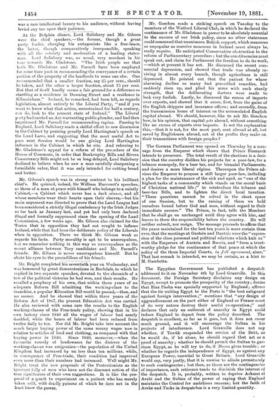The German Parliament was opened on Thursday by a mes-
sage from the Emperor which shows that Prince Bismarck intends to persevere. The total result of the elections is a deci- sion that the country dislikes his projects for a poor-law, for a tobacco monopoly, for a beer tax, and for biennial Parliaments, and desires a more liberal regime. Thereupon the Prince ad- vises the Emperor to propose a still larger poor-law, including a plan for the maintenance of the sick and aged, as "one of the highest tasks of a community which stands on the moral basis of Christian national life ;" to reintroduce the tobacco and beer-tax Bills, and to lighten the direct local taxation. " These questions cannot be solved in the short space- of one Session, but to the raising of them we hold ourselves bound before God and man, without regard to their immediate success." The Prince, in fact, tells the Members that be shall go on unchanged until they agree with him, and leaves to them the responsibility before the country. He will neither submit, nor resign. The message proceeds to affirm that the peace maintained for the last ten years is more certain than, ever, that the meetings at Gastein and Dantzic were the " expres- sion of the close personal and political relations which knit us" with the Emperors of Austria and Russia, and " form a trust- worthy pledge for the continuance of that peace at which the policy of the three Imperial Courts, in full agreement, aims,' That last remark is intended, we may be certain, as a hint to• M. Gambetta.






































 Previous page
Previous page